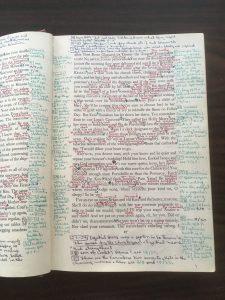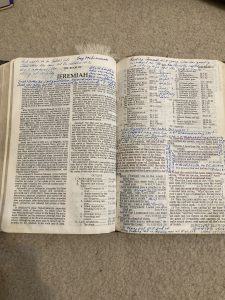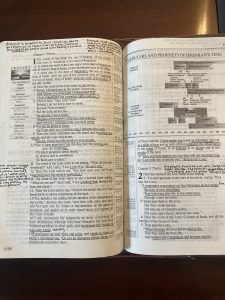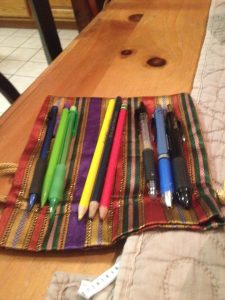My friend Warren was asking me some questions about reading, so I shared a few of my regular practices. He said they were helpful, so I thought it might be instructive to others if I wrote them down.
Here then are three things that have guided my reading for many years.
Be engaged!
I do whatever I can to put myself in the best mood possible for reading. It means strong coffee, favorite pens and pencils (picture below), good lighting, being as rested as possible, and seizing all kinds of moments for opportunities to read. I read in line at the post office, waiting for my haircut, and when appointments are running late, but most of my serious reading happens in my favorite chair in our upstairs library.
Books are always highlighted with a red pencil and marginal notes are made with either a black pen or regular pencil (see picture below). If the ink does not bleed through the page, my preference is always to make notes in the margin with a black pen. I always use a very fine point pen for crisp and vivid writing. Fine point pens (and the Tul pens I purchase are not expensive) are also great because they do not easily smudge.
Along with keeping me engaged, taking notes helps me come back later to a book and quickly access what I might use in my teaching and writing. This has paid big dividends over the many years I’ve been doing it.
You are having a conversation
My posture in reading is that I am having a conversation. This means I am not passively receiving what is written. As with all conversations, I try to be a good listener. I also ask lots of questions. This is true whether I am reading the Bible or some other book like the one in the picture. More on that in a moment.
Remembering that I am having a conversation instead of just absorbing information is also a great boon to staying engaged.
Reread the best books
C.S. Lewis said serious readers are rereaders. I’ve found enormous benefit from rereading the best books. Not all books are best so rereading is simply following Francis Bacon’s famous advice:
“Some books are to be tasted, others to be swallowed, and some to be chewed on and digested.”
The older I get (currently 63) the more I am enjoying revisiting the books that have either shaped me for many years or those much rarer, new books that cross my radar and wow me. The Pilgrim’s Progress is in the former category while Fleming Rutledge’s amazing book, The Crucifixion, is in the latter category. The picture below is my copy of The Crucifixion. The first time I read the 600+ page masterpiece I made nearly 600 notes in the margins. The second time I read The Crucifixion I made connections and gained insights that were missed during my first read. The second time I made many more notes in the margins such that it now totals north of 900 marginal notes.
When I was teaching at Wheaton College I took some time to check out The Marion E. Wade Center. It houses an amazing amount of scholarship dedicated to seven writers: J.R.R.Tolkien, Dorothy Sayers, G.K. Chesterton, Charles Williams, Owen Barfield, George MacDonald, and C.S. Lewis. I knew Lewis put marginalia in his books so I wanted to see a few examples. The Wade Center contains many of the books that Lewis had in his personal library. To my delight, the librarian brought up one of my favorite books: Paradise Lost by Milton.
The marginalia of Lewis did not disappoint. In tiny, meticulous script (using a pencil) Lewis flooded the pages with notes. What was true of the way John Adams read also applies to Lewis. Adams, it was said, seemed at times to write more of his own words on a book’s page than the author he was reading! If someone as brilliant as Lewis (three degrees from Oxford all with first class honours) thought writing in books was important, who am I to disagree?
I trust these strategies motivate you to be a more engaged reader.








